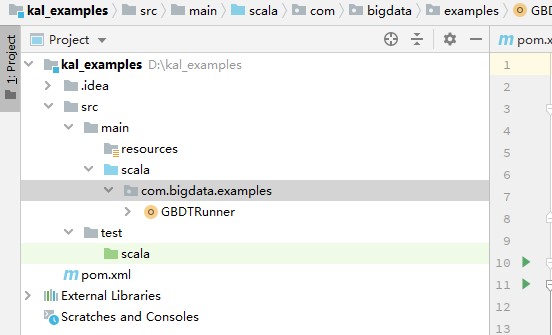开发程序
提供1个开发应用程序案例,基于机器学习算法加速库中的GBDT算法。
- 将工程中“src/main”和“src/test”目录下的“java”文件夹重命名为“scala”,“java”目录上右击,依次选择“Refactor”、“Rename”,然后输入“scala”。

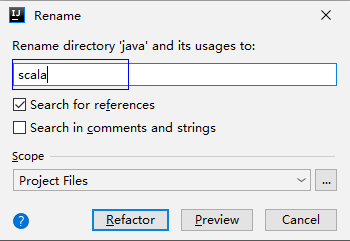
- 在根目录下pom文件中添加依赖,将以下内容复制替换到pom.xml中。
<project xmlns="http://maven.apache.org/POM/4.0.0" xmlns:xsi="http://www.w3.org/2001/XMLSchemainstance" xsi:schemaLocation="http://maven.apache.org/POM/4.0.0 http://maven.apache.org/maven-v4_0_0.xsd"> <modelVersion>4.0.0</modelVersion> <groupId>com.bigdata</groupId> <artifactId>kal_examples_2.11</artifactId> <version>0.1</version> <name>${project.artifactId}</name> <inceptionYear>2020</inceptionYear> <packaging>jar</packaging> <properties> <maven.compiler.source>1.8</maven.compiler.source> <maven.compiler.target>1.8</maven.compiler.target> <encoding>UTF-8</encoding> <scala.version>2.11.8</scala.version> </properties> <dependencies> <dependency> <groupId>org.apache.spark</groupId> <artifactId>spark-mllib_2.11</artifactId> <version>2.3.2</version> </dependency> <dependency> <groupId>it.unimi.dsi</groupId> <artifactId>fastutil</artifactId> <version>8.3.1</version> </dependency> </dependencies> <build> <sourceDirectory>src/main/scala</sourceDirectory> <plugins> <plugin> <groupId>net.alchim31.maven</groupId> <artifactId>scala-maven-plugin</artifactId> <version>3.2.0</version> <executions> <execution> <goals> <goal>compile</goal> </goals> <configuration> <args> <arg>-dependencyfile</arg> <arg>${project.build.directory}/.scala_dependencies</arg> </args> </configuration> </execution> </executions> </plugin> </plugins> </build> </project> - 在新建工程中的新建工程中,在“src/main/scala/”目录下,新建package“com.bigdata.examples”,右键单击。

输入“com.bigdata.examples”,单击“OK”。

- 在“com.bigdata.examples”package中新建GBDTRunner.scala文件,右键单击“com.bigdata.examples”选择。

输入“GBDTRunner.scala”,单击“OK”。
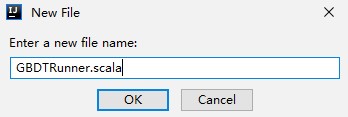
将以下代码复制到GBDTRunner.scala文件中:
package com.bigdata.examples import org.apache.spark.SparkConf import org.apache.spark.sql.SparkSession import org.apache.spark.ml.Pipeline import org.apache.spark.ml.classification.{GBTClassificationModel, GBTClassifier} import org.apache.spark.ml.evaluation.MulticlassClassificationEvaluator import org.apache.spark.ml.feature.{IndexToString, StringIndexer, VectorIndexer} object GBDTRunner { def main(args: Array[String]): Unit = { val conf = new SparkConf().setAppName(s"gbdtEvaML") //定义任务名称 val spark = SparkSession.builder.config(conf).getOrCreate() //创建任务session val trainingData = spark.read.format("libsvm").load("hdfs:// /tmp/data/epsilon/epsilon_normalized") //读取训练集 .repartition(228) //对数据进行分区 val testData = spark.read.format("libsvm").load("hdfs:// /tmp/data/epsilon/epsilon_normalized.t") //读取测试集 .repartition(228) //对数据进行分区 val labelIndexer = new StringIndexer() //对标签进行索引 .setInputCol("label") //设置输入标签列 .setOutputCol("indexedLabel") //设置输出标签列 .fit(trainingData) //将以上操作应用到训练集 val labelIndexer = new StringIndexer() //对标签进行索引 .setInputCol("label") //设置输入标签列 .setOutputCol("indexedLabel") //设置输出标签列 .fit(testData) //将以上操作应用到测试集 val featureIndexer = new VectorIndexer() .setInputCol("features") //设置输入特征列名称 .setOutputCol("indexedFeatures") //设置输出特征列名称 .setMaxCategories(4) //设置大的索引编码数量,超过就不进行索引 .fit(trainingData) //将以上操作应用到训练集 val featureIndexer = new VectorIndexer() .setInputCol("features") //设置输入特征列名称 .setOutputCol("indexedFeatures") //设置输出特征列名称 .setMaxCategories(4) //设置大的索引编码数量,超过就不进行索引 .fit(testData) //将以上操作应用到测试集 val gbt = new GBTClassifier() //定义GBT分类模型 .setLabelCol("indexedLabel") //设置模型输入标签列 .setFeaturesCol("indexedFeatures") //设置模型输入特征列 .setMaxIter(100) //设置GBT最大迭代次数 .setMaxDepth(5) //设置每棵子树最大树深 .setMaxBins(20) //设置最大分桶数 .setStepSize(0.1) //设置学习率 val labelConverter = new IndexToString() //将索引标签转化成原始标签 .setInputCol("prediction") //设置输入标签列 .setOutputCol("predictedLabel") //设置输出预测标签列 .setLabels(labelIndexer.labels) //设置加载标签 val pipeline = new Pipeline() //定义pipeline任务流 .setStages(Array(labelIndexer, featureIndexer, gbt, labelConverter)) //定义pipeline任务流每个阶段任务 val model = pipeline.fit(trainingData) //调用fit接口,进行训练,执行pipeline val predictions = model.transform(testData) //对testData进行预测 val evaluator = new MulticlassClassificationEvaluator() //定义评价指标 .setLabelCol("indexedLabel") //设置预期的正确结果(真值)输入列 .setPredictionCol("prediction") //设置模型预测结果(预测值)输入列 .setMetricName("accuracy") //对真值和预测值使用精度比较 val accuracy = evaluator.evaluate(predictions) //执行评价指标,返回精度 println("Test Error = " + (1.0 - accuracy)) //打印测试分类误差 val gbtModel = model.stages(2).asInstanceOf[GBTClassificationModel] println("Learned classification GBT model:\n" + gbtModel.toDebugString) //打印模型参数 } }
对于维度高且样本量少的数据集,标签索引和特征索引起到的性能优化作用比较有限,有可能使整体耗时变长。
文件目录结构如图1所示。
- 单击右侧边框,输入“package”,按回车,进行项目打包,在“target\”目录中生成kal_examples_2.11-0.1.jar。
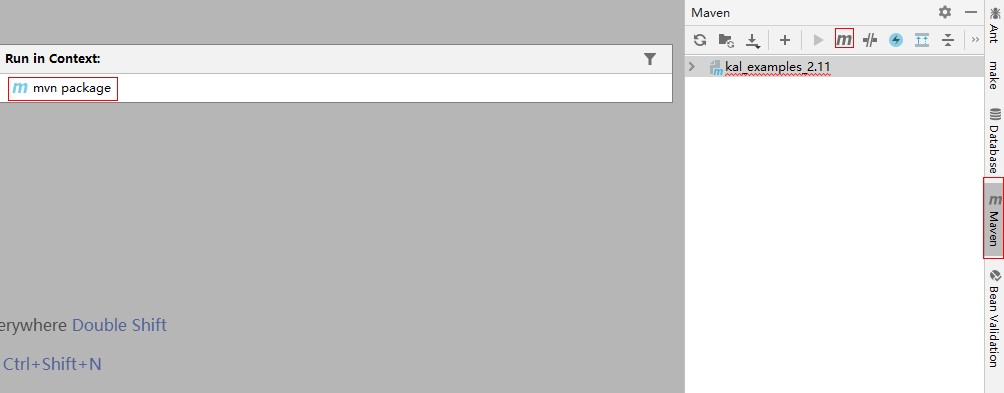
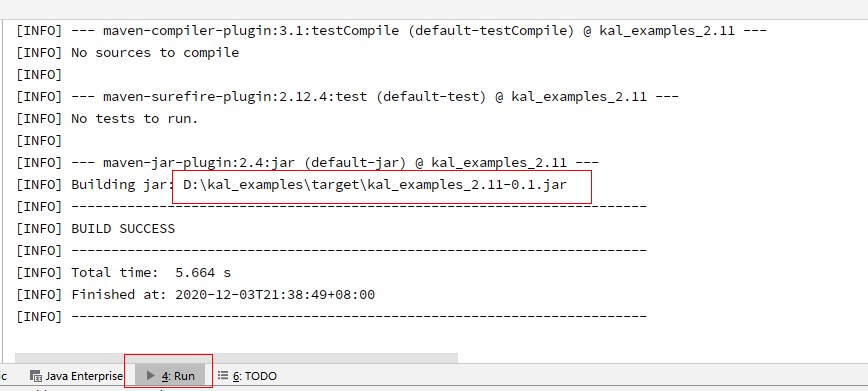

KNN算法为机器学习算法加速库纯自研算法,使用KNN API时,需要将编译代码获得的sophon-ml-kernel-client_2.11-1.2.0.jar安装到Maven的本地仓库,具体主要分为以下4个步骤:
- 修改上文机器学习2中的pom文件,在“<dependencies>...</dependencies>”中增加sophon-ml-kernel-client_2.11-1.2.0.jar的相关依赖。
<dependency> <groupId>org.apache.spark</groupId> <artifactId>sophon-ml-kernel-client_2.11</artifactId> <version>1.2.0</version> </dependency>
- 在根目录下新建lib文件夹,右键单击。

- 将编译代码获得的sophon-ml-kernel-client_2.11-1.2.0.jar放入新建的lib文件中。
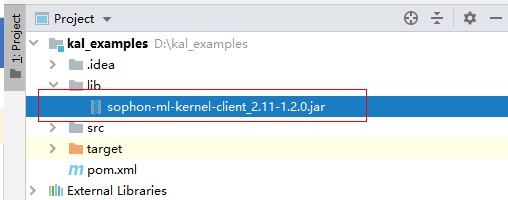
- 单击右侧边框,输入“install:install-file -DgroupId=org.apache.spark DartifactId=sophon-ml-kernel-client_2.11 -Dversion=1.2.0 -Dfile=lib/sophon-ml-kernelclient_2.11-1.2.0.jar -Dpackaging=jar”,按“Enter”完成安装。

父主题: 样例工程
